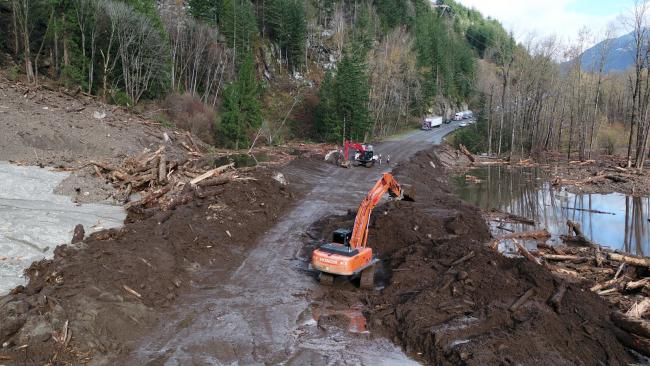Articles Menu

November 18th 2021
Extreme weather fuelled by climate breakdown is exposing the vulnerability of key infrastructure in British Columbia and is reviving questions among environmentalists and residents about building the Trans Mountain expansion pipeline.
That’s in part because the atmospheric river that hammered B.C.’s Interior, combined with a brutal wildfire season and landslides, left the terrain primed for flooding. It remains unclear precisely how much of the TMX pipeline route is impacted, but concerns are mounting because if the expansion project is built, it could be hit by a similar disaster.
Moreover, Abbotsford is where Trans Mountain has its Sumas Terminal. That terminal is a key part of the pipeline system that stores hundreds of thousands of barrels of oil and includes a pump station that sends crude either to Burnaby or into Washington state.
Near the Sumas Terminal is the Barrowtown Pump Station, where late Tuesday the station came within an inch of being overwhelmed. Abbotsford issued an evacuation order, saying if the pumps failed, water from the Fraser River would flow into the already flooded community.
“This event is anticipated to be catastrophic,” the evacuation order read.
The pumps held, thanks to staff and volunteers defending the station with a sandbag dam through the night, CBC reports.
Longtime Abbotsford resident and community activist John Vissers says this disaster should be a wake-up call for the Trans Mountain project given the Sumas Terminal’s proximity.
“I'm not a gloom and doomer at all, but we can't argue anymore that these kinds of extreme weather events [are rare],” he said.
“We know these events are going to become more and more common, and we simply don't have the infrastructure to protect our communities from these kinds of catastrophic failures.”
In anticipation of the extreme weather, the Trans Mountain pipeline shut down Sunday. On Wednesday, the Crown corporation confirmed it remains idle and said it is working on plans to restart operations following geotechnical studies to ensure the stability of the ground. The company declined to answer specific questions.
The series of Trans Mountain setbacks this year due to climate breakdown should force a reassessment of the project, says @350Canada organizer @CamFenton. #cdnpoli #BC #ExtremeWeather #TMX - Twitter
“What I've always tried to do here in the community is show people that we can act right here and have a global impact, and we could have done that simply by doing something like rejecting [TMX],” said Vissers.
“Once we allow something to happen, then we're responsible for the consequences too. And the consequences are what we're seeing around us right now,” he said.
Climate advocacy group 350 Canada’s Cam Fenton said the series of Trans Mountain setbacks this year due to climate breakdown should force a reassessment of the project.
“There was a point in time over the summer where workers had to stop working because it was too hot, there was a point in the summer where multiple sites couldn't be worked on because they were on fire ... entire sections of the pipeline under construction have been buried in landslides,” he said.
He called it “emblematic” of Canada’s approach to the climate crisis.
The federal government is saying “we're doing everything to tackle [the crisis],” but the pipeline “is literally being buried by climate impacts,” he said.
“I think that really raises the question of if we're not going to reconsider this in this moment, why not?”
In a statement, NDP environment critic Laurel Collins said the party’s priority at the moment is pushing the federal government to do everything it can to support those impacted by flooding, but “it’s clear” natural disasters will become more common and severe as the climate crisis worsens.
“The Liberal government has to take immediate action to assist the people of B.C., but they also need bolder action to address the long-term realities of the climate crisis,” she said.
“Instead of spending billions of dollars on a pipeline and giving fossil fuel subsidies to big oil companies, the Trudeau government should be investing in emergency preparedness measures and climate-resistant infrastructure.”
Natural Resources Canada did not return a request for comment.
[Top photo: Excavators work to clear a section of Highway 7 east of Agassiz following a mudslide. Photo via B.C. Ministry of Transportation and Infrastructure / Flickr (CC BY-NC-ND 2.0)]